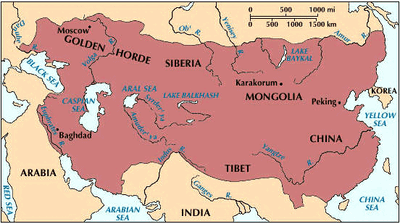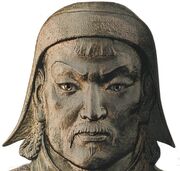
The Mongol Empire at its zenith
The Mongolian Empire, united under Genghis Khan, he was a son of a minor Mongol chieftain, the Mongol clans proved to be one of the fiercest empires ever recorded. After successfully defeating his brother Jamukha in battle, Temüjin took the name Genghis Khan which means "universal ruler" in 1206. He swept across Asia; first, overcoming the Kara Khitan Khanate of Central Asia and the Khwarezmid Empire by 1218.
Silk road

Khan's first victories earned the Mongols' reputation to grow further as they sacked many silk road trading cities and all towns that dared resist their authority of power. Even for well-organized states, the Mongols speed on horseback proved to be a very formidable opponent. In 1227, Genghis Khan died and two years later, Ogedei, a son of Genghis Khan, was elected the new Great Khan. Ogedei sent his army into China where they pushed out the northern Jin dynasty in 1234. He then set his eyes westward and had almost all of Russia, including their most important city, Kiev, conquered by 1240. The Europeans were striked with fear, seeing no end to the Mongol's appetite and feared that they were next to be conquered. Luckily, for them, Ogedei's death in 1241 caused the Mongols to withdraw to elect a new Great Khan. Years later, in 1251, the new Great Khan was Mongke. Mongke campaigned both in northern China and against the Abbasid Caliph, sacking Baghdad in 1260. His death caused much of the Mongol army in the Middle East to withdraw, however, leaving a small enough army for the Egyptian Mamluks to successfully defeat them in battle. In the 1270s, the next khan, Kublai Khan, had conquered South China from the Song dynasty and very nearly conquered Japan as well (He also assisted in creating the stories mentioned in The Travels Of Marco Polo. By the mid 1300s, the Mongols were well in decline but did have one last resurgence when Tamerlane united much of Central Asia, threatening the rise of the Ottoman Empire, but was miserably ended with his death in 1405.
